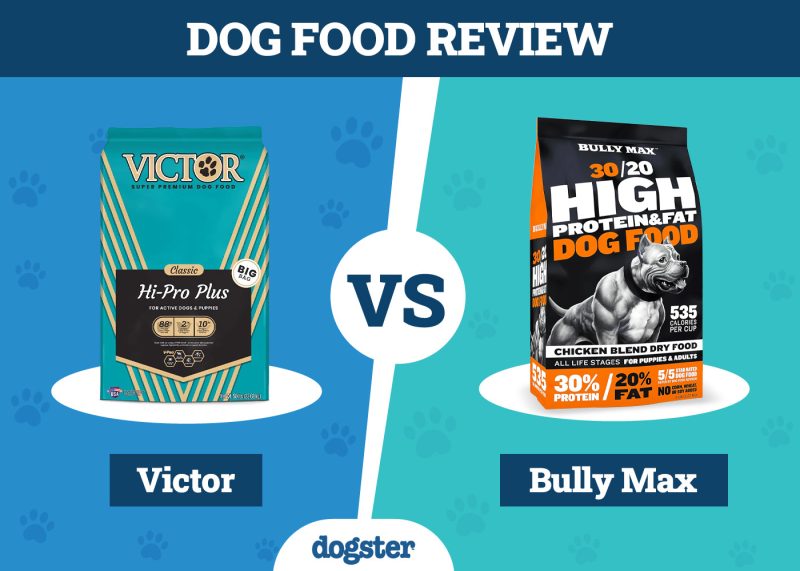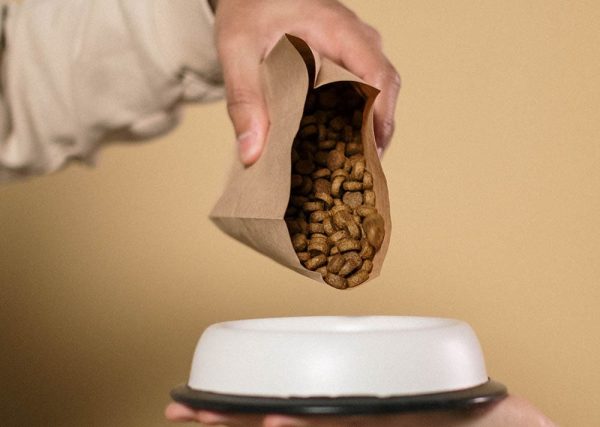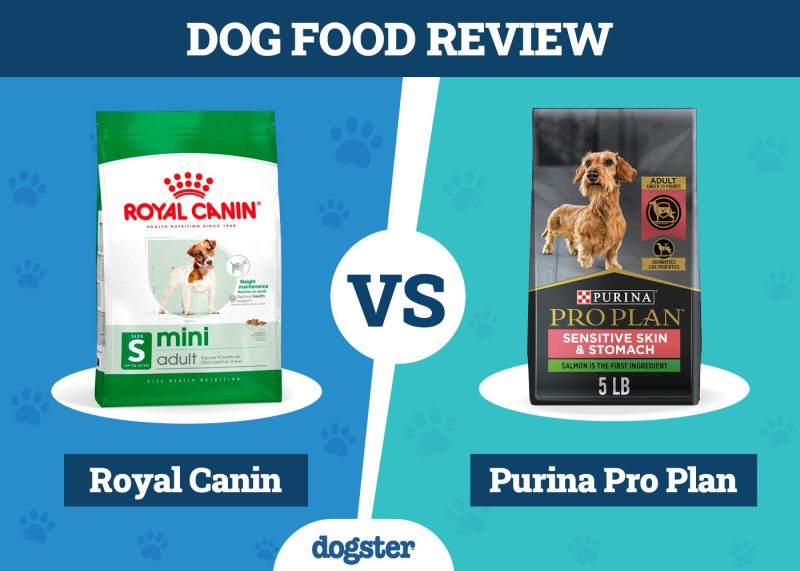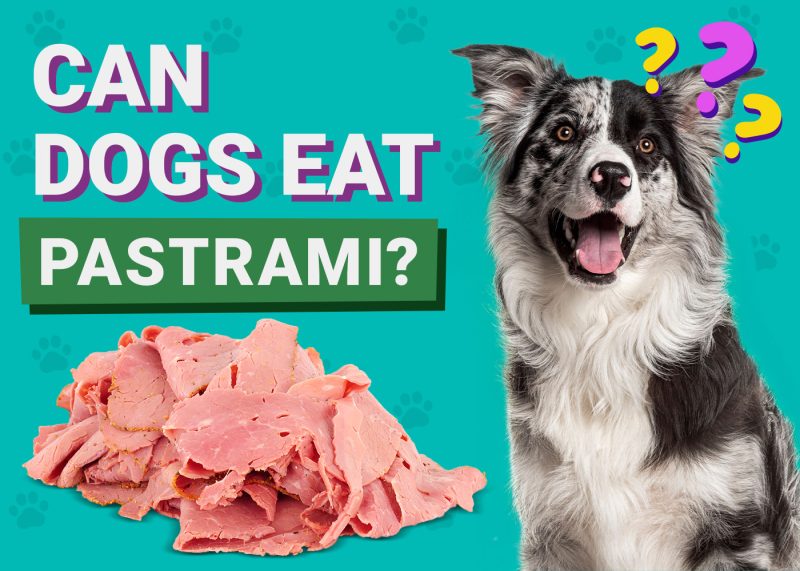In this article
View 3 More +It’s no secret that our dogs absolutely love meat! They will salivate by our dinner plates anytime we have a nice slab of steak or chunk of chicken. You might already know that you can give your dog some boiled, unseasoned meat as part of their daily diet.
However, have you thought about seafood? It’s no secret that our kitties love seafood, but can dogs have it? If you’re wondering if your dog can eat shrimp, they can! You just have to make sure you cook and portion it correctly.

Always Check With Your Vet
Shrimp can be a very nutritious food to offer your pet on occasion. However, before you make any definitive decision, always check with your veterinarian. Your vet will okay shrimp in your dog’s diet based on any existing food sensitivities or dietary restrictions.
Each dog will be different due to underlying health conditions or life stages. So, if you haven’t done so already, make sure to call your vet to get the green light.
If you need to speak with a vet but can't get to one, head over to PangoVet. It's our online service where you can talk to a vet online and get the advice you need for your pet — all at an affordable price!
Dogs Can Have Shrimp
Dogs can absolutely have shrimp in moderation. However, as we know, too much of anything can be a bad thing, and because shrimp contains a high amount of cholesterol and sodium, it isn’t good for dogs to have it every day.
However, adding it as a little treat or an occasional nutritional boost can be very positive. Your dog will think it’s ever-so-yummy. Plus, it won’t cause a lot of extra fat in your dog’s diet, unlike red meat.
There can be a few things to take note about getting your dog shrimp. It has upsides and downsides, and all it really needs is the correct preparation and portion control.
Shrimp Nutrition Facts
- Calories: 99
- Fat: 0.3 g
- Carbohydrates:2 g
- Cholesterol: 189 mg
- Sodium: 111 mg
- Protein: 24 g
Benefits of Shrimp
There are certainly bountiful benefits of shrimp for our pooches. Firstly, it is a lean meat source that won’t necessarily impact weight gain. Plus, it’s packed full of vitamins and minerals that keep your pup healthy.
- Vitamin B12: Vitamin B12 is responsible for the body making DNA. In addition, it helps keep blood and nerve cells functioning properly.
- Phosphorus: Phosphorus is a very important mineral. It helps form strong bones and teeth, and also affects how the body utilizes carbohydrates and fats.
- Magnesium: Magnesium plays a role in muscle and nerve function and energy production.
- Iodine: Iodine makes thyroid hormones, which distribute evenly throughout the body. It controls metabolism, brain development, and other functions.
- Niacin: Niacin, or vitamin B, is responsible for turning food into energy. It also assists the nervous, digestive, and skin systems and staying healthy.
- Potassium: Potassium and sodium work hand in hand. Each one needs the other to maintain normal fluid levels inside the cells. Potassium is also helpful for muscle contraction and normal blood pressure.
- Antioxidants: Antioxidants remove free radicals from the body that cause disease.
- Omega-3 Fatty Acids: Omega fatty acids greatly improve skin health. They also help make hormones, regulate blood clotting, strengthen and relax arterial walls, and reduce inflammation.
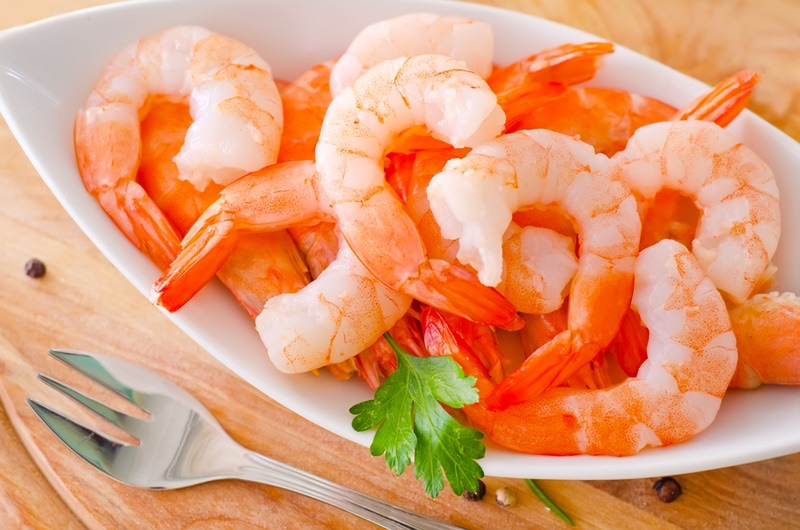
Downfalls of Shrimp
Even though shrimp has significant benefits to your dog’s diet, it has its downfalls too! Here are a few things to remember when serving your canine this seafood item.
Never Let Your Dog Eat Raw Shrimp
Raw shrimp can be incredibly dangerous for your dog to eat. Raw fish of any kind can carry harmful bacteria, namely Salmonella, which can make both dogs and humans very unwell.
- Gastroenteritis
- Fever
- Nausea
- Vomiting
- Abdominal pain
- Diarrhea
Shrimp can also carry various internal parasites, such as tapeworms, that can spread to your dog.
Fortunately, these hazards can all be avoided by thoroughly cooking your shrimp. Boiling shrimp is most generally the easiest method of cooking. You should add no additional seasonings or butter and oil. Give your dog lean, cooked portions free of any extras.
Shrimp Can Be an Internal Hazard
Shrimp have a tough exterior, covered in a layer called chitosan. If you boil the shrimp and don’t take off this outside layer, it can cause a choking hazard to your dog. It is possible for these fragmented pieces to lodge in your dog’s throat or gastrointestinal tract, causing an obstruction.
Even if it doesn’t cause a problem going down the esophagus, it can be a little troublesome for the GI tract. Your dog can have a very hard time digesting it. If your dog swallows enough, it could also cause bowel obstruction in extreme cases. If you suspect a shrimp casing is lodged in the throat or potentially causing a bowel obstruction, get your dog to your vet immediately for evaluation.
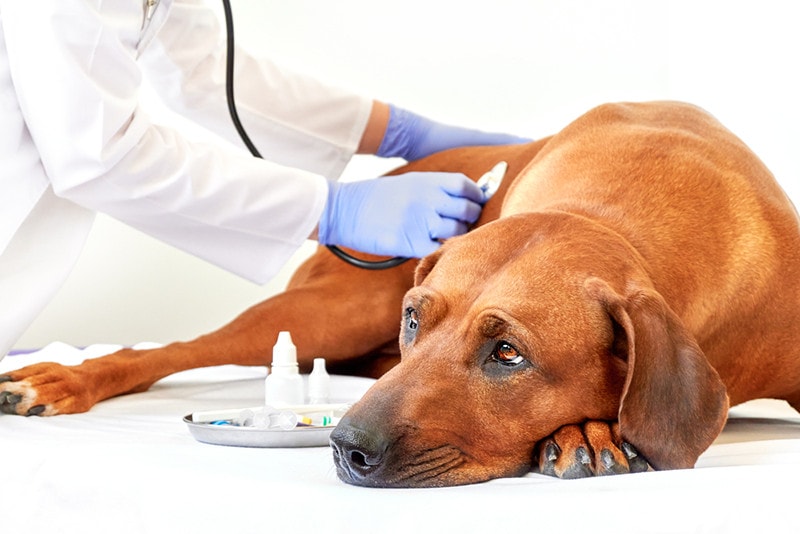

How Much Shrimp Can Your Dog Eat?
Your dog can safely eat roughly three to four pieces of shrimp per week. You can offer them as a delicious snack or piece one shrimp apart and added as a topper to a daily meal.
Importance of a Balanced Diet for Dogs
Proper meals are important regardless of the healthy additives you enhance your dog’s diet. Your dog will require a commercially balanced diet to keep them their healthiest. There are several food choices on the market these days.
Dry kibble is still one of the most popular due to its long shelf life and wide range availability. However, more light is being shed on the importance of canine-specific recipes, tailoring to match the needs of their wild ancestors. High-quality commercial foods will generally contain the right balance of nutrients, but there is more of a shift towards fresher options to meet those nutritional needs.
Many families are switching to fresh food options for a variety of reasons. First of all, fresh food is proving to be more beneficial than more traditional types, by providing a more natural source of the protein, fats, and minerals needed. Most of them are also prepackaged and have a predetermined portion to cater to the needs of your individual pooch.
However, these options, as of now, are more expensive. So, ultimately, it is the best diet for your budget—your vet will help you decide. Do bear in mind that when it comes to pre-prepared dog foods, the cheaper they are, the cheaper the ingredients are – you get what you pay for.


Final Thoughts
Now you know that your dog can enjoy a delicious piece of shrimp now and again. Always ensure the shrimp is cooked wholly and thoroughly peeled to avoid choking or illness. Your dog can safely enjoy up to four pieces of shrimp per week.
Keep in mind that even though shrimp can be very nutritious for your dog, you shouldn’t feed this food item daily.
See also:
Featured Image Credit: Rob Owen-Wahl, Pixabay



